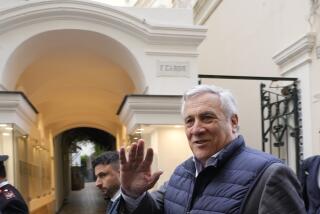Bonn Rejects Curbs but Ties Libya to Raids
- Share via
BONN — The West German government Friday rejected a U.S. call for economic sanctions against the Libyan government but acknowledged that it had evidence that Libya was involved in the terrorist attacks at Rome and Vienna airports last week.
Government spokesman Norbert Schaefer said that West Germany, which imports about $2.4 billion worth of oil from Libya each year, considers sanctions “inappropriate.”
But the government spokesman said that if the evidence of Libyan involvement in the two airport attacks, which killed 19 people, turned into “watertight proof,” West Germany and its allies would consider some kind of action, short of sanctions, against the regime of Col. Moammar Kadafi.
Awaits ‘Watertight Proof’
“The federal government has learned that there is evidence of support for the terrorists’ attacks which points to the government of a third country,” Schaefer told a news conference. “If these firm clues should become watertight proof, the government will then coordinate joint measures with its European partners.”
He later said that Libya was the country he was talking about.
Israeli and U.S. sources in Jerusalem and Washington have charged that the twin airport attacks Dec. 27 were masterminded by the militant Palestinian leader, Abu Nidal, who, they said, has been backed by Kadafi.
Both the United States and Israel have threatened to retaliate against Libyan targets if it becomes absolutely clear that the terrorists trained in or operated from the North African country.
The Bonn government spokesman would not elaborate on what steps short of sanctions Western European nations could take against Libya, a country that supplies West Germany and Italy, among others, with a good deal of oil and buys European-made trucks, machinery and other products in return.
No Economic Sanctions
Bonn has ruled out economic sanctions on the grounds that they are rarely effective, and Schaefer declared Friday, “The federal government is of the opinion that economic sanctions are not a suitable instrument, certainly not in this case either.”
Some West German sources speculated that anti-Libyan steps might take the form of crackdowns on incoming nationals from the country or reducing the number of flights between the two nations.
Meanwhile, the Israeli ambassador to West Germany, Yitzak Ben-Ari, called on the world community to cease its purchases of oil from Libya as an effective method of retaliation against Kadafi’s support of terrorists.
In an interview with the Cologne Express newspaper, Ben-Ari was quoted as saying that “any country that buys oil in Libya indirectly finances terrorism with its petrodollars. An oil boycott against Libya would shut off the flow of money to terrorist murderers.”
Ironically, much of Libya’s crude production is supervised by four major U.S. oil companies.
Other Nations Cool
Wire services reported that other Western nations reacted coolly Friday to Reagan’s call for sanctions against Libya.
Britain flatly opposed sanctions, and most other nations said they would wait and see.
In London, a Foreign Office spokesman said British policy had not changed since April, 1984, when Foreign Secretary Geoffrey Howe ruled out sanctions against Libya.
Britain broke relations with Libya then, following the slaying of a British policewoman during an anti-Kadafi demonstration in front of the Libyan embassy and also banned further arms shipments to Libya.
In Amsterdam, a Foreign Ministry spokesman said the Netherlands, which will hold the European Communities chairmanship for the next six months, is considering a joint Common Market response to the call for sanctions. He refused to elaborate.
No Italian Action Seen
In Rome, officials of the five-party coalition expressed their disapproval of Libya’s latest actions, but it was considered unlikely that Italy--Libya’s top trading partner--would join any move for sanctions. Libya owns 13% of Fiat, Europe’s largest auto-maker, which is headquartered in Turin, and more than 40,000 Italians work in Libya. In 1983, Italy exported nearly $2 billion in products to Libya and imported $1.5 billion in goods from the North African nation.
Rome’s leftist La Repubblica newspaper said Prime Minister Bettino Craxi’s strong words following the airport massacres were unlikely to be backed by strong action that might rupture “the long, even tormented, friendly ties” between the two nations.
In Paris, the government made no comment, but an External Relations Ministry spokesman noted that the United States had made no concrete proposals for action against Libya.
Lukewarm Relations
The newspaper Le Matin said relations between France and Libya are only lukewarm, and they had signed no major contracts since 1981. French exports to Libya in 1984 totaled $240 million and imports were $947 million, mostly in oil. However France imports only 5% of its oil from Libya.
“Libya therefore does not constitute for the moment an important market for the French. . . . An eventual stoppage of trade between Paris and Tripoli could therefore only have limited repercussions,” Le Matin said.
In Brussels, officials would say only that Belgium was studying the situation and Reagan’s call for sanctions. Unofficially, Belgium is in a unique situation because its ambassador in Tripoli represents U.S. interests in Libya, and all anti-American demonstrations are held at the Belgian Embassy.
More to Read
Sign up for Essential California
The most important California stories and recommendations in your inbox every morning.
You may occasionally receive promotional content from the Los Angeles Times.













